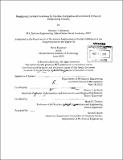Realigning contract incentives for the non-competitive environment of the US shipbuilding industry
Author(s)
Alvarran, Dominic T. (Dominic Thomas)
DownloadFull printable version (14.23Mb)
Other Contributors
Massachusetts Institute of Technology. Department of Mechanical Engineering.
Advisor
Olivier L. de Weck and Mark W. Thomas.
Terms of use
Metadata
Show full item recordAbstract
It is suspected that the lack of commercial shipbuilding available in the US resulting in the consolidation of the US shipbuilding industry as a whole limits the negotiating capacity for the US Navy and promotes suboptimal contracts that continuously produce major cost and production time overruns. Several incentives and contracting strategies are explored to better incentivize, through formal and informal means, the best value for the Navy in the production of large ships. These methods mainly include a sharper focus within the contracts on the scale and alignment of incentives. Some incentives in use in current contracts were found to be counterproductive to the goals of reduced cost, timeliness, and quality because of the disproportionate scaling of one goal's incentive over the others. Once the share-line incentive is lost as in the LPD 17 program, there is much less of a need for the shipbuilder to control costs. Also, a redirection of resources spent on smaller incentives in order to increase larger incentives such as larger order quantities is suggested. These improvements, however, might only lead to a marginal effect in contract efficiency at best. In order to produce a larger effect, the competitive base in the shipbuilding industry must be increased. This increase in the competitive base is possible through a large capital investment into an existing tier 2 shipyard in order to increase its production capabilities to the level of a tier 1 shipyard.
Description
Thesis (Nav. E.)--Massachusetts Institute of Technology, Dept. of Mechanical Engineering, 2013. "June 2013." Cataloged from PDF version of thesis. Includes bibliographical references (p. 79-81).
Date issued
2013Department
Massachusetts Institute of Technology. Department of Mechanical EngineeringPublisher
Massachusetts Institute of Technology
Keywords
Mechanical Engineering.